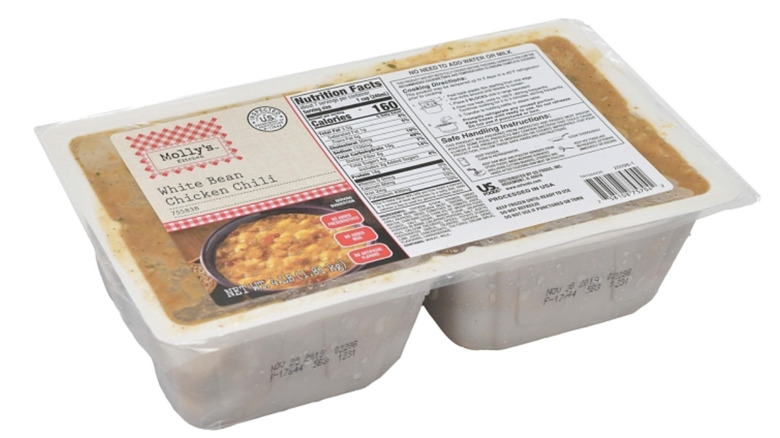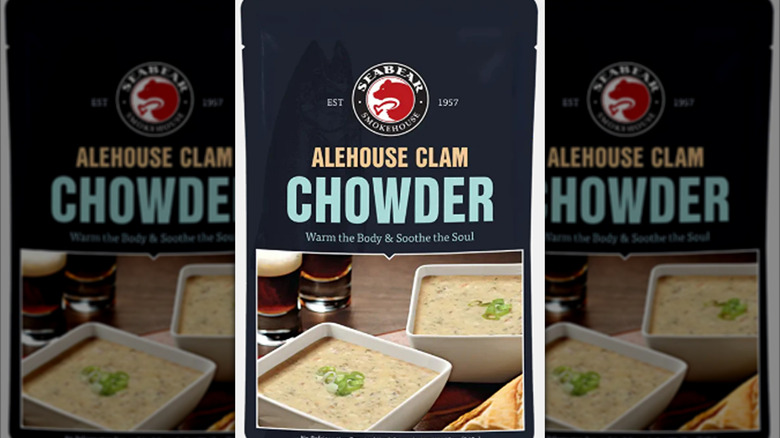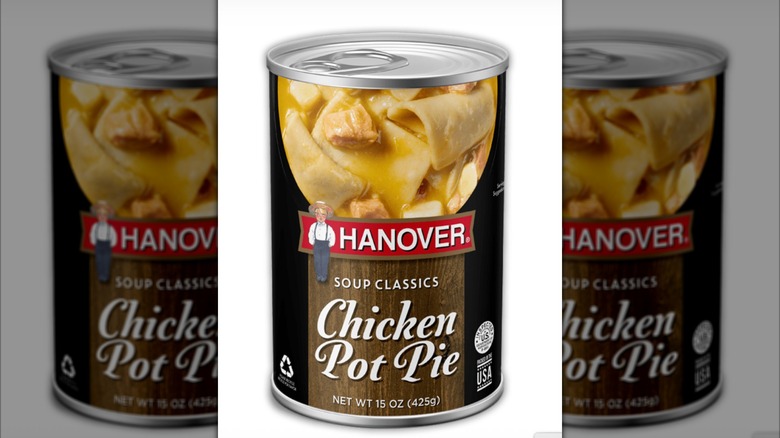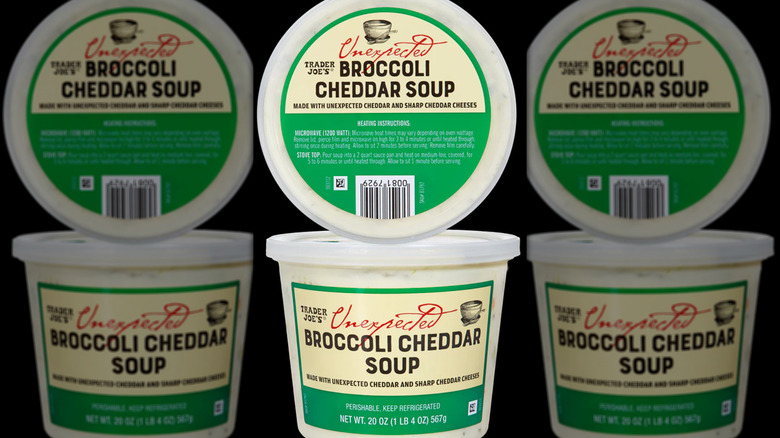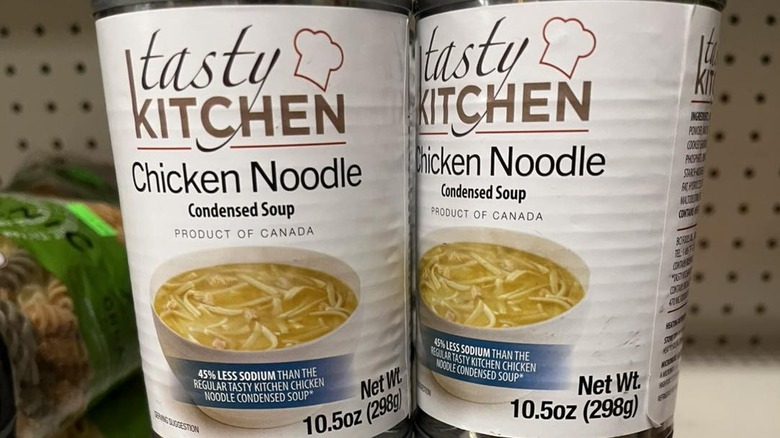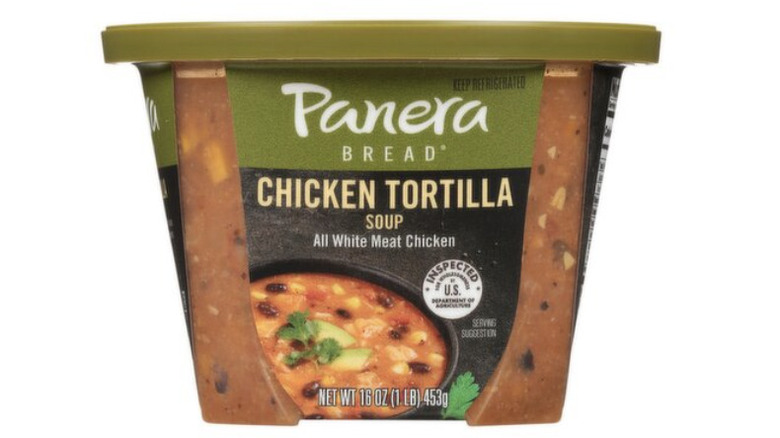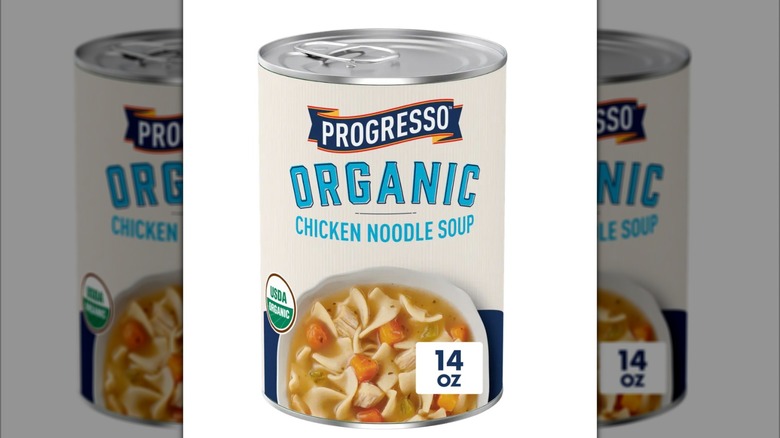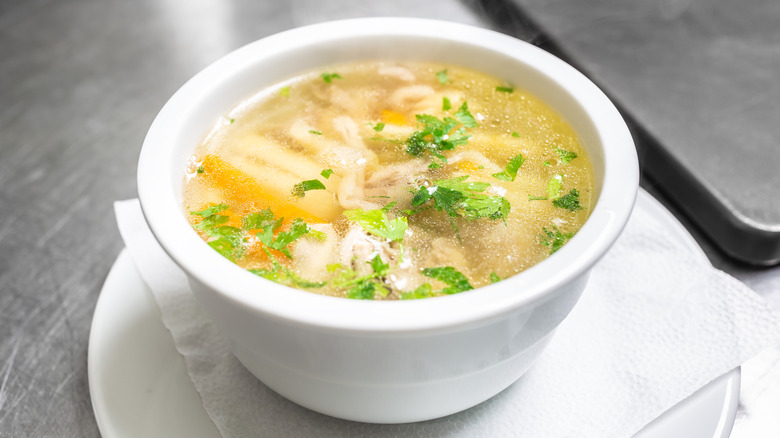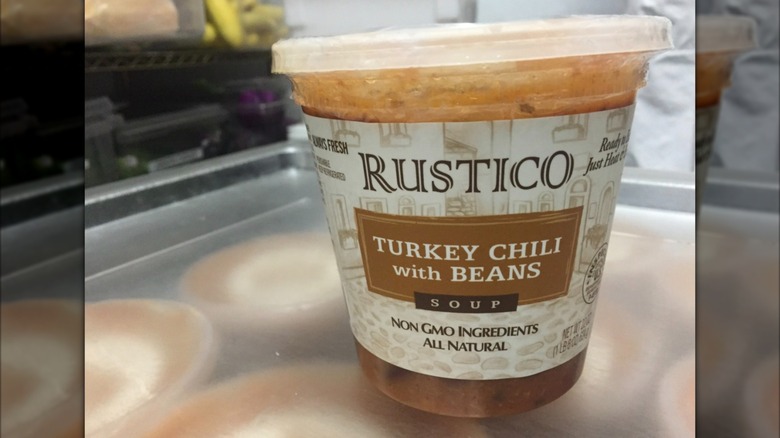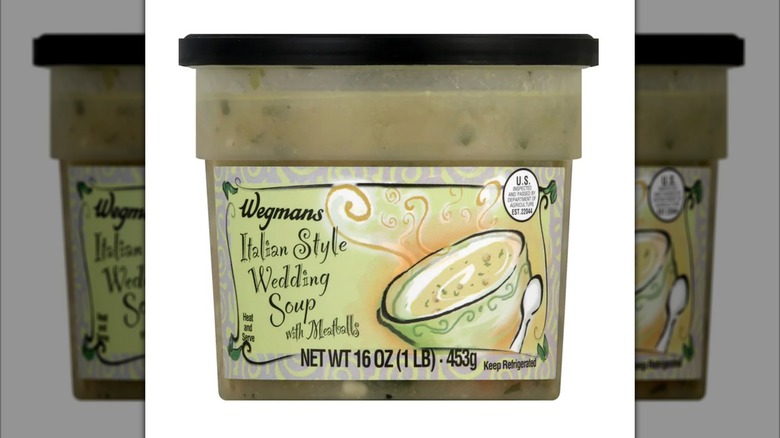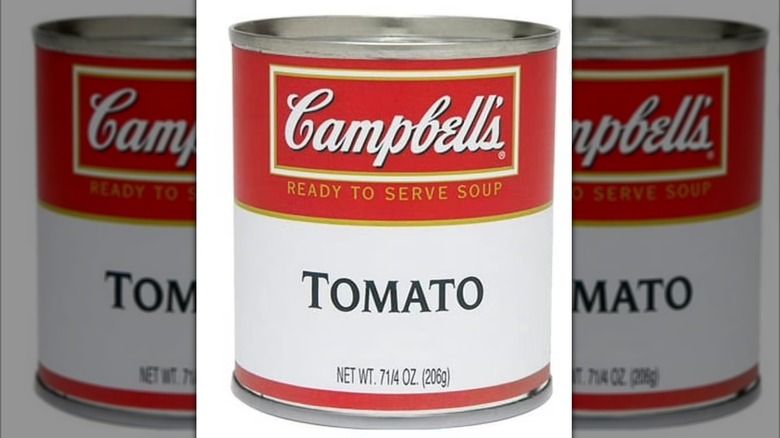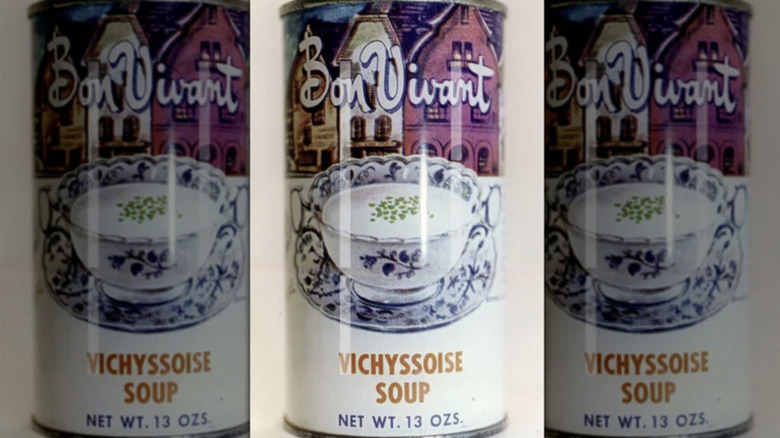Soup Recalls That Affected Millions
We may receive a commission on purchases made from links.
Flavorful and typically loaded with vegetables and protein, soup is one of those dishes that never goes out of style. Whether hearty and warming or light and refreshing, a bowl of soup often brings to mind family gatherings and home-cooked meals. For all its comfort, soup can be surprisingly time-consuming to prepare. From chopping ingredients to simmering bones or vegetables to make stock, the process demands a lot of patience. As such, it's little wonder that many home cooks reach for shortcuts.
Canned soups have been around since the turn of the 20th century, really coming into their own in the 1950s. Whether eaten solo or combined with other ingredients to prepare dishes like homemade casseroles and mac and cheese, canned soups quickly became a kitchen staple in many homes. And as their popularity grew, so did mass production — and increased risks. Over the years, companies have had to initiate countless soup recalls, making headlines in the process. Many of these safety alerts have stemmed from a range of quality control issues, such as undeclared allergens, faulty packaging, or contamination with a foreign object.
Interested in learning more about some of the most significant soup recalls in U.S. history? Here is our rundown of the country's most notable recalls and the reasons behind them.
Multiple food brands recall soup products due to possible presence of wood fragments (2025)
In April 2025, the U.S. Department of Agriculture's Food Safety and Inspection Service (FSIS) sparked a recall frenzy after announcing that certain soup products may have been contaminated with pieces of wood. The affected products included three Campbell's soups, as well as soup products from Campbell's subsidiaries, including Verve, Health Request, Life Cuisine, Molly's Kitchen, Sysco, and Meijer Crafted Market. All in all, 13 products were recalled, such as White Bean Chicken Chili Soup, Spicy Chicken Nacho Soup, and Thai Style Soup with Chicken.
The wood fragments found were ultimately linked to the cilantro used in the production. While some of the soups were sold at supermarkets, others had been shipped to various restaurants and institutions, making the recall that much trickier. Luckily, the products were only distributed in four states — Illinois, Indiana, Michigan, and Ohio — restricting the scope of the recall to a limited area. While no adverse health effects were reported at the time, a contaminant like wood can lead to injuries like mouth lacerations and chipped teeth.
SeaBear Smokehouse recalls chowders due to risk of botulism (2025)
Whether it's a can or a pouch, a product container needs to be fully sealed to keep its contents not just fresh, but also free from bacterial contamination like botulism. Faulty packaging is precisely what led to SeaBear Smokehouse's recall of two chowder varieties in March 2025. The affected products included SeaBear Salmon Chowder and Alehouse Clam Chowder shipped to stores in Alaska, California, Colorado, Oregon, and Washington. The soups were also available online for nationwide distribution.
The safety alert was sparked by a consumer who notified SeaBear that there was a problem with the seal on one of its soup pouches. Upon further investigation, the company discovered faulty equipment had prevented the seals from fully bonding. Since any compromised seal poses a serious risk of botulism contamination, SeaBear Smokehouse promptly pulled the chowders from supermarket shelves.
Botulism is a foodborne illness which is often linked to canned, preserved, or fermented foods that haven't been properly sealed. The serious condition is characterized by symptoms such as weakness, difficulty breathing, dizziness, and double vision. In the most severe cases, the bacterial infection can even lead to death.
Aunt Kitty's Foods recalls pot pie soup products due to misbranding and undeclared allergens (2023)
Like a regular pot pie but without the crust, pot pie soup captures the flavors of this classic dish without the fuss of a pastry shell. However, in 2023, canned pot pie soup sparked concerns among consumers after it was recalled due to undeclared soy. The product in question was Aunt Kitty's Foods Hanover Soup Classics Chicken Pot Pie. In total, the company pulled 15,700 pounds of the soup from circulation. The 15-ounce cans were distributed in Ohio, Maryland, Pennsylvania, Texas, and Virginia.
Soy is one of the nine major food allergens listed by the FDA, alongside milk, eggs, fish, shellfish, tree nuts, peanuts, wheat, and sesame. Allergens can lead to serious health issues in sensitive individuals, including gastrointestinal problems, hives, diarrhea, vomiting, and cough. In the worst case scenarios, allergens such as soy can cause anaphylaxis, a life-threatening condition that requires immediate medical attention.
Undeclared allergens like soy are a common reason for recalls. In 2024, 802 VT Frozen recalled over 8,000 pounds of frozen pizzas because they contained soy that wasn't listed on the packaging. Similarly, in 2021, a company recalled its 365 Everyday Value Whey Protein Powder for the same reason. Arizona Nutritional Supplements pulled the product from circulation after discovering that it contained undisclosed soy.
Winter Gardens Quality Foods recalls Trader Joe's Unexpected Broccoli Cheddar Soup over insect contamination (2023)
In July 2023, Trader Joe's Unexpected Broccoli Cheddar Soup lived up to its quirky name when it was discovered that it contained an extra ingredient — insects. Winter Gardens Quality Foods initiated the product recall after the creepy crawlies were found in the soup's frozen broccoli florets. The Pennsylvania-based company recalled nearly 11,000 cases of the product, equating to around 130,000 bowls of soup. The broccoli cheddar product had already been shipped and distributed to retail locations in Florida, Illinois, California, Texas, Washington, Pennsylvania, and Connecticut.
While the Unexpected Broccoli Cheddar Soup health alert constituted one of the biggest recalls in Trader Joe's history, there were no documented cases of adverse health effects to the product at the time. Nevertheless, the FDA gave the recall a Class II designation, reserved for "a situation in which use of, or exposure to, a violative product may cause temporary or medically reversible adverse health consequences or where the probability of serious adverse health consequences is remote."
BCI Foods recalls chicken noodle soup due to lack of inspection (2023)
Under FSIS regulations, all meat and poultry products imported into the U.S. must undergo a mandatory inspection at the point of entry to the country. However, this critical protocol wasn't followed when BCI Foods imported Tasty Kitchen Chicken Noodle Condensed Soup from Canada in 2023. This oversight resulted in a safety alert that saw more than 13,000 pounds of chicken soup recalled due to a lack of adequate inspection. The products were shipped to retailers in California, Michigan, Minnesota, and Tennessee.
BCI Foods isn't the only company that has come under scrutiny for violating FSIS' strict guidelines on product imports into the country. In a similar incident in 2021, Avanza Pasta ended up in hot water after failing to follow the federal inspection protocol when importing its range of pasta products, including ravioli and tortellini. In total, the company recalled close to 10,000 pounds of pasta items, highlighting just how serious the FSIS is about any lapses in its regulatory protocol.
Interested in the most significant chicken soup recalls in U.S. history? Dive into our article on chicken soup recalls that affected millions.
Blount Fine Foods recalls Panera Bread Chicken Tortilla Soup due to potential contamination with foreign material (2021)
Recent years have seen more and more restaurant chains expand to offer branded grocery items, such as ready-to-eat soups, salads, and frozen entrees. Panera Bread is one of them, licensing Blount Fine Foods to produce its "Panera Bread at Home" line of soups — including the Chicken Tortilla Soup that became the subject of a food recall in 2021. Instead of being served at the chain's restaurants, the prepackaged, 16-ounce containers of soup were sold at grocery stores in stores in Arizona, Florida, Georgia, and Texas.
The Panera Bread Chicken Tortilla Soup recall made headlines after several customers reported finding pieces of a glove in their meal. It's unclear how the fragments of gray nitrile glove material ended up in the soup. All in all, Blount Fine Foods pulled 6,384 pounds of the tainted chicken tortilla soup from supermarket shelves. Luckily, no adverse health effects were linked to the product at the time.
General Mills recalls Progresso Organic Chicken Noodle Soup due to mislabeling and undeclared ingredients (2020)
Founded way back in 1866 as a flour mill, General Mills has grown into a retail powerhouse that represents over 100 brands. In fact, the Minneapolis-based conglomerate ranks among the world's largest food manufacturers. Some of the better-known General Mills brands include Betty Crocker, Häagen-Dazs, Cheerios, and Wheaties. General Mills also manufactures soups under its Progresso brand.
Proving that experience and scale can't always prevent mishaps, in 2020, General Mills recalled Progresso Organic Chicken Noodle Soup due to a labeling error. In this particular case, the product alert was announced by Faribault Foods, which was responsible for the production of the soup. The mix-up involved cans of chicken noodle soup that actually contained a meatball and pasta product. Notably, the latter contained milk and soy, which both appear on the FDA's major allergen list, as well as beef and pork — all ingredients that were not disclosed on the chicken soup label. At the end of the day, the company recalled 15,134 pounds of Progresso soup.
Kettle Cuisine recalls chicken soup due to misbranding and undeclared allergens (2020)
Kettle Cuisine has been manufacturing artisanal soups, sauces, and ready-to-eat meals for nearly four decades. From muffins and pastries to pasta and rice, the company carries a huge range of culinary offerings for both restaurants and grocery stores. In a classic case of food labeling oversight, Kettle Cuisine filled its 24-ounce cups of Mom's Chicken Soup with an Italian wedding soup with meatballs. Aside from being a completely different product, the Italian wedding soup contained three of FDA's nine major allergens — eggs, milk, and wheat. In total, the Massachusetts-based company ended up pulling more than 3,000 pounds of chicken soup from circulation.
Highlighting that even a seemingly small oversight in food production can have grave repercussions, the FDA gave Mom's Chicken Soup recall a Class I designation — the highest classification possible. A Class I recall pertains to "a situation in which there is a reasonable probability that the use of, or exposure to, a violative product will cause serious adverse health consequences or death."
Rustico Foods recalls soup products without federal inspection (2015)
Food inspections serve an important purpose, confirming that the products on our tables are actually safe to eat. They also help ensure that we purchase exactly what is advertised on the label, without any additional ingredients that could potentially make us sick or cause allergic reactions. In 2015, Rustico Foods announced a safety alert that involved a range of its prepackaged soups, after it was discovered that they didn't undergo the mandatory federal inspection. In fact, the products were produced outside the set inspection hours.
The recall involved 2,659 pounds of Chicken Matzo Ball Soup, Turkey Chili with Beans Soup, and Chicken Vegetable Soup manufactured over one month. The poultry-based soups were only sold at retail stores in Southern California, making the recall easier to contain than larger-scale incidents. Fortunately, the products were not linked to any adverse health effects at the time.
Blount Fine Foods recalls Wegmans meat and poultry soup products over contamination with plastic fragments (2012)
Established in 1916 in Rochester, New York, Wegmans Food Markets is still run by the Wegman family. Starting as a single store, the chain has expanded to more than 110 locations in the Northeast U.S. While Wegmans boasts the greatest presence in New York with 50 locations, the chain also has a strong foothold in Pennsylvania and Virginia.
Wegmans' reputation came into question when Blount Fine Foods recalled four different soup types sold under the Wegmans Food Markets label in 2012. The reason? Consumers reported finding plastic fragments in the products. The potentially tainted soups included Wegmans Chicken and Dumpling Soup, Italian Wedding Style Soup with Meatballs, Gazpacho Soup, Tomato Basil with Orzo Soup, Caribbean Black Bean Soup, and Lobster Bisque.
While it's unclear how the plastic pieces ended up in the soup, it's believed that the products were contaminated during the production process. No injuries were associated with the grocery items at the time, but the Class II recall affected approximately 4,100 pounds of soup.
Campbell's recalls Ready To Serve Classic Tomato Soup over undeclared allergens (2002)
Founded as Anderson & Campbell in 1869, Campbell's sold its first jar of soup in 1895. Things reached a turning point when Dr. John T. Dorrance, who worked for the company, invented a method of condensing soup, effectively reducing the size of the packaging of its products. In 1898, Campbell's introduced its iconic red and white label, which remains synonymous with the company's products to this day.
Despite its longevity and pedigree, Campbell's isn't immune to mistakes and costly recalls. One notable example took place in 2002, when it pulled nearly 20,000 cases of tomato soup in one of the largest canned soup recalls of the early 2000s. Since the soup had been distributed across 37 states, it was also a logistical nightmare for the company. More specifically, Campbell's recalled its 18.7-ounce cans of Ready To Serve Classic Tomato Soup because they actually contained the Ready To Serve Classic Creamy Tomato Soup. This meant that the labeling on the Ready To Serve Classic Tomato Soup omitted two crucial allergens that were present in the can: milk and soy protein.
The discovery was made after two customers complained about the mismatched contents of the cans. The potentially deadly mishap was traced back to a single day of production, when a labeling error occurred at the plant. While no illnesses were linked to the product at the time, undeclared allergens can have devastating consequences, in some cases even leading to anaphylaxis and death.
Bon Vivant recalls soup products under various brand names due to concerns over botulism (1971)
What made the 1971 Bon Vivant recall of Vichyssoise soup so devastating was how it came to light. The company discovered that there was something terribly wrong with the product after it caused one death and left another individual in the same household paralyzed. Further investigation uncovered that this was caused by the botulism bacteria present in the can.
At least five cans of the soup were later found to also be contaminated with the deadly pathogen. After defective cans were identified in additional product lines, the recall was expanded to encompass all canned goods produced by Bon Vivant, including those distributed under alternative brand names. This effectively meant that Bon Vivant ended up pulling an astonishing 1.5 million cans of products worth around $600,000, close to $4.5 million in today's money.
It came as no surprise that the scale of the recall put Bon Vivant out of business. After all, the company was manufacturing 52 different varieties of soup, nine types of sauces, and 14 other canned products. After filing for bankruptcy and incorporating as Moore & Co., the company fought the FDA in court to get its canned goods back. The legal battle lasted three years, after which the FDA destroyed all of the cans.

